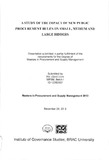| dc.contributor.advisor | Babu, Mujahid Mohiuddin | |
| dc.contributor.author | Islam, Md. Zikrul | |
| dc.date.accessioned | 2017-05-28T08:37:43Z | |
| dc.date.available | 2017-05-28T08:37:43Z | |
| dc.date.copyright | 2012 | |
| dc.date.issued | 2012-12-29 | |
| dc.identifier.other | ID 12282007 | |
| dc.identifier.uri | http://hdl.handle.net/10361/8190 | |
| dc.description | This dissertation is submitted in partial fulfillment of the requirements for the degree of Masters in Procurement and Supply Management, 2012. | en_US |
| dc.description | Cataloged from PDF version of thesis. | |
| dc.description | Includes bibliographical references (page 70). | |
| dc.description.abstract | Procurement has been identified as one of tl.re most significant areas that largely affect public sector performance. As part of the broad public sector reforms, the government of Bangladesh has undertaken management of implementation challenges aiming to improve performance of public procurement progressively towards strengthening overall governance. The Central Procurement Technical Unit (CPTU) has been implementing the Public Procurement Reform Project II (PPRPII) to improve performance of the public procurement system progressively in Bangladesh, focusing largely on the key ministries and targeting their implementing agencies. As part of the broad public sector reforms, the government has undertaken management of implementation challenges aiming to improve performance of public procurement progressively towards strengthening overall sectoral governance. In order to achieve the aims and objectives, a permanent unit, called Central Procurement Technical Unit (CPTU) was established in 2002. This is an implementing unit in the field of procurement reform and monitoring of reform implementation. Reform process was carried out with ultimate outcomes of formulation and issuance of a unified procurement processing system (Public Procurement Regulations-2003), Implementation Procedures for PPR 2003, Public Procurement Processing and Approval Procedures (PPPA), Revised Delegation of Financial Powers (DOFP) and several Standard Tender Documents (STDs)/Standard Request for Proposal Document for the procurement of Goods, Works and Services. In 2006, the Public Procurement Act (PPA 2006) was passed by the Parliament and in 2008, a new set of Public Procurement Rules (PPR 2008) was issued. The PPA 2006 and PPR 2008 were made effective from 31 January, 2008.
The purpose of the study is to gather information about existing environment related to public procurement system and understand knowledge, perception and practice of stakeholders, procuring entities and bidders regarding public procurement system. The study is expected to help develop long term visions for smooth implementation of PPR-2008 and design communication interventions.
The objective of the study is to determine level of public understanding and appreciation of the procurement system and the values that have been added to it including proper management of public fund, outsourcing the provision of goods and services in a competitive manner, accountability of public officials etc. in Bangladesh.
The objectives of the study were achieved through two approaches; the first one was a valid questionnaire that was obtained from respondents' of RHD, LGED and PWD. The second one is achieved through key informant interviews of officers and bidders. A questionnaire was prepared to gather information on attitude, ideas and understanding of the stakeholders about public procurement and incorporate those into the development of a comprehensive communication strategy, and design communication interventions to popularize the Public Procurement Rules, 2008.
After getting the response from the respondents' from questionnaire and key informant interview, the study recommends some of the key areas for improvement like;
A comprehensive training / orientation program be designed, developed and implemented. It is being suggested that:
• Each of the courses addresses and describes the salient features of the PPA and PPR
• Rules dealt with in the PPR document
• Guidelines and steps to be followed by the procuring entity and the bidders
• Roles and responsibilities of various stakeholders in the implementation of PPR
• Advantages and benefits of following the PPR.
A policy decision be taken to design and implement planned communication activities for popularizing and smoothly implementing the PPR.
Based on the present situation analysis and other relevant information already captured, a detailed communication strategy including the action be designed and developed.
An efficient and pragmatic monitoring, supervision and evaluation of the communication campaign be in-built into the program.
Now that PPR-2008 is in place, it has been felt that in order to raise awareness and understanding of the same, strategic communication activities need to be undertaken for which a broad-based communication strategy is of utmost necessity. This then is the rationale for this proposed study. | en_US |
| dc.description.statementofresponsibility | Md. Zikrul Islam | |
| dc.format.extent | 81 pages | |
| dc.language.iso | en | en_US |
| dc.publisher | BRAC University | en_US |
| dc.rights | BRAC University dissertation reports are protected by copyright. They may be viewed from this source for any purpose, but reproduction or distribution in any format is prohibited without written permission. | |
| dc.subject | Procurement rules | en_US |
| dc.subject | Bidders | en_US |
| dc.title | A study of the impact of new public procurement rules on small, medium and large bidders | en_US |
| dc.type | Thesis | en_US |
| dc.contributor.department | BRAC Institute of Governance and Development, BRAC University | |
| dc.description.degree | M. Procurement and Supply Management | |

